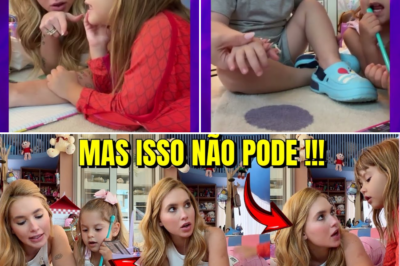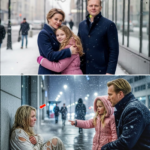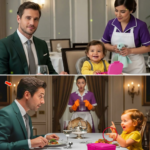
The golden light of late afternoon bathed the cobblestone streets of Colonia Roma when Lucerito Mijares suddenly stopped walking. Her cheerful steps, light and rhythmic just moments earlier, halted as if someone had gently touched her shoulder. Just a few feet away stood a little girl, no more than 8 years old, clutching a bunch of wildflowers in her small hands. Her shy smile contrasted with the quiet strength in her dark eyes.
Beside Lucerito was her mother, Lucero, the celebrated artist, who immediately noticed the change in her daughter’s expression. Lucerito had inherited from her mother a rare emotional sensitivity—an ability to feel what others felt, deeply and instinctively. But this moment was something else. Something was stirring inside her.
The girl with the flowers wore a neatly mended dress and worn but well-tied shoes. Her name was Mariana, and she had come out that afternoon with her 5-year-old brother Diego, walking the neighborhood as they did three times a week to help their mother by selling flowers. From a humble home in the poorest part of the neighborhood, their life was full of love, responsibility, and hard-earned dignity.
Elena, their mother, watched from a distance, keeping a quiet, protective eye on them. She worked tirelessly sewing clothes at night while her husband labored in construction by day. Their life was not easy, but it was honest—and that was what Elena taught her children to value.
Mariana approached cautiously but confidently. “Would you like to buy some flowers?” she asked with a soft but clear voice, addressing Lucero while stealing glances at Lucerito.
What happened next was pure magic. Lucerito knelt down to Mariana’s eye level. “Did you pick these yourself?” she asked with sincere curiosity.
“Yes,” Mariana beamed. “My mom and I picked them early this morning. They’re fresher that way. Want to smell them?”
Lucerito inhaled deeply. “They smell like happiness,” she whispered. And in that moment, something profound passed between the girls. A spark, a connection, a quiet recognition.
Lucero stood nearby, watching. She’d known fame, success, adoration. But what she saw now—the dignity of a little flower seller and the genuine bond forming between her daughter and Mariana—was unlike anything she’d experienced before.
Diego approached shyly, holding out a tiny yellow flower. “This is for you,” he said, offering it to Lucerito. “It’s the prettiest one we found.”
Lucerito took it as if it were the most precious gift in the world. “Thank you,” she whispered, holding it close to her chest.
The two families—so different on the surface—began to open to one another. “What’s your name?” Lucerito asked.
“Mariana,” she replied. “And this is Diego, my little brother.”
“I’m Lucerito, and this is my mom, Lucero.”
Mariana gave a small, respectful bow, the kind her mother had taught her. “Nice to meet you, señora Lucero,” she said with touching sincerity.
Lucero smiled warmly. “The pleasure is mine, Mariana.”
Mariana explained that they sold flowers every Tuesday, Thursday, and Saturday. “My mom says being consistent helps people trust us.”
Lucero was struck by the wisdom in her words. When she praised Mariana’s mother, the girl smiled proudly. “She says every flower tells a story. We help those stories find the people who need them.”
“What’s the story of these?” Lucerito asked.
Mariana looked down at the bouquet in her hands and spoke with the focus only children can summon. “We found them in an abandoned garden near our home. No one was taking care of them, but they kept growing—strong and beautiful. My mom says we’re like those flowers.”
Lucerito was visibly moved.
Just then, Elena approached, concern written across her face. “Mariana, Diego, are you bothering them?”
“Not at all,” Lucero replied before her children could even speak. “We’ve had the most beautiful conversation.”
Elena’s hands bore the signs of hard work, her face lit by a tired but sincere smile. She apologized for any inconvenience, but Lucerito interrupted, still holding the little yellow flower. “I’d like to buy all your flowers,” she said.
Silence.
“All of them?” Elena asked softly.
“Yes. But on one condition,” Lucerito smiled.
“What condition?” Mariana asked curiously.
“That you take me to the garden where you found them.”
Elena hesitated, unsure. But seeing the genuine light in the young girl’s eyes, she nodded. “Tomorrow morning, before it gets too hot. Around 7?”
“Perfect,” Lucerito agreed.
Lucero turned to Elena. “This isn’t out of pity,” she clarified. “My daughter is just… like this. When something touches her, she gives her whole heart.”
“I can see that,” Elena responded, recognizing the truth in her words.
As the children talked, Lucerito noticed how closely Mariana and Diego worked together. “Do you always work as a team?”
“Always,” Mariana nodded. “Mom says family is a team. Everyone has to care for each other.”
“My mom says that too,” Lucerito smiled.
“Is your dad working?” Diego asked, growing braver.
“Yes, he’s a musician. He travels but always comes back home.”
“Mine works in construction far away sometimes, but he always comes home at night,” Mariana said proudly.
The girls, from such different worlds, found a shared language in love and family. “I’d like us to be friends,” Lucerito finally said.
“I’d like that too,” Mariana replied, her smile now radiant.
“I can be your friend too?” Diego asked, holding out his tiny hand.
“Of course,” Lucerito said, shaking it gently. “The best friends come in sibling pairs.”
Elena’s eyes welled with tears.
Then Lucero extended an invitation. “Would it be okay if Mariana and Diego came to our house after the garden visit tomorrow? For breakfast?”
Elena was stunned. “We wouldn’t want to impose.”
“It wouldn’t be an imposition at all,” Lucero insisted.
“Can we, Mommy?” Mariana asked eagerly. “What about Papa?” Diego chimed in.
“He’ll be working,” Elena said. “But we can tell him all about it later.”
“Then we can go!” Mariana exclaimed.
Lucerito then asked, “Mom, can we pay for the flowers now?”
Lucero nodded and pulled out more than enough. “How much for all?”
“240 pesos,” Elena said, her voice still unsure.
Lucero handed her 300. “The extra is for the beautiful story Mariana told us.”
Elena looked down at the bills, her eyes full of unspeakable gratitude. Not just for the money, but for the respect, the dignity with which her family had been treated.
As Mariana and Diego packed the flowers with great care, Elena asked, “Where do you live?”
“In La Condesa,” Lucero answered. “We’ll come for you tomorrow at 8. Sound good?”
“Perfect,” Elena nodded. “We’re at Insurgentes Norte 247, apartment 3B.”
Lucerito, now holding a dozen bouquets like a fragrant rainbow, turned to Mariana.
“Do you know what I’ll do with all these flowers?”
“What?” Mariana asked.
“I’ll place them in every room of my house, so every space has your story. And every time I see them, I’ll remember you and Diego.”
Tears glistened in Mariana’s eyes. “Really?”
“Really,” Lucerito said. “And tomorrow, I’ll find flowers for you too.”
For the first time in her life, Mariana felt like her flowers were something more than just a way to earn money. They were pieces of beauty. Carriers of connection. And now, symbols of a new and unexpected friendship.
News
Virgínia Rompe o Silêncio Sobre Leonardo no Hospital e Revela Mágoa Que Ninguém Imaginava
A segunda-feira começou tensa para o mundo sertanejo e para milhões de seguidores atentos a cada movimento da família Costa….
Virgínia rompe o silêncio, se recusa a visitar Leonardo no hospital e expõe ferida que vinha crescendo dentro da família
A madrugada de segunda-feira começou diferente. Ainda antes do sol nascer, portais de Goiás noticiaram que Leonardo havia sido internado…
Sumiço de Neymar em Paris e Story de Biancardi Acendem Alerta: Coincidência ou Recado Silencioso?
O silêncio, às vezes, fala mais alto do que qualquer pronunciamento. E foi exatamente esse silêncio que transformou a ausência…
O silêncio de Neymar, o sumiço repentino e a indireta de Biancardi que deixou tudo ainda mais tenso
Tudo aconteceu de forma silenciosa demais para ser normal. Sem anúncio oficial, sem justificativa clara e sem aquela movimentação típica…
O pedido inesperado das Marias para o Natal deixa Virgínia sem reação e derrete a internet
O clima já era de festa, casa cheia, risadas espalhadas pelos cômodos e aquele barulho gostoso de família reunida quando…
O Pedido de Natal das Marias que Deixou Virgínia em Choque e Derreteu a Internet
O Natal ainda nem chegou, mas um momento simples dentro de casa foi suficiente para emocionar, arrancar risadas e surpreender…
End of content
No more pages to load









